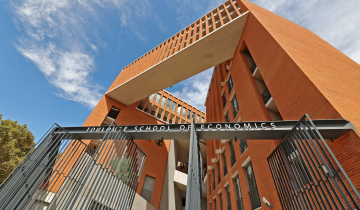 Tim Ederer will defend his thesis on Monday 26 June at 14:00 (Auditorium 3)
Tim Ederer will defend his thesis on Monday 26 June at 14:00 (Auditorium 3)
«Essays in Labor Economics : Empirical Models of Two-Sided Matching and Teacher Spatial Sorting »
Supervisors: Professors Matteo Bobba and Thierry Magnac
To attend the conference, please contact the secretariat Christelle Fotso Tatchum
Memberships are:
Matteo BOBBA:Professor Assistant, Université Toulouse Capitole, Supervisor
Thierry MAGNAC:Professor, Université Toulouse Capitole, Co-supervisor
Gabrielle FACK:Professor, Université Paris-Dauphine (PSL), President
Caterina CALSAMIGLIA COSTA : Professor, IPEG Barcelone, Rapporteure
Yinghua HE :Professor assistant, Université Rice, Rapporteur
Abstract :
This thesis is composed of three chapters that have two main objectives: (i) broaden our understanding of the empirical content of two-sided matching models by developing novel methodological tools and (ii) apply these tools to get a thorough understanding of the causes and consequences of spatial inequalities in access to skilled teachers and provide concrete policy recommendations.
In the first chapter of this thesis, I develop a unifying static framework of one-to-one and many-to-one matching without transfers and investigates how data on realized matches can be leveraged to identify and estimate preferences of participating agents. I find that, under parsimonious assumptions on preferences, one can only identify the joint surplus function both in the one-to-one and many-to-one case. I reconcile this finding with seemingly contradictory results from the literature. I then propose ways to overcome this negative result both in the one-to-one and many-to-one matching case making these tools applicable to a wider range of settings, such as marriage or labor markets.
In the second chapter, co-authored with Matteo Bobba, Gianmarco León-Ciliotta, Christopher Neilson and Marco Nieddu, we show that increasing teacher compensation in remote schools is effective at reducing spatial inequalities in student achievement and provide tools to design such policies in a cost effective way. Leveraging an unconditional change in the structure of teacher compensation in Perú, we first provide causal evidence that a 30% increase in salaries in rural locations attracted higher quality teachers which translated into an average increase in student test scores of 0.33-0.38 standard deviations. We then use detailed data on job postings and applications to identify and estimate teachers' labor supply elasticities under minimal assumptions. This allows us to design a procedure that systematically delivers the wage schedule that shifts labor supply such as to reach a given social objective at a minimal cost. We use these tools to design two cost-effective wage bonus policies that would either (i) attract at least one certified teacher in each school or (ii) close the urban-rural gap in teacher quality.
Finally, in the third and last chapter, I provide a unifying explanation for the lack of supply of skilled teachers in remote locations. To do so, I build an empirical model of dynamic two-sided matching to link teachers' and schools' preferences with equilibrium sorting and job-to-job flows. I show that this mapping is invertible such that preferences can be identified and estimated from observed matches. Taking these tools to panel data on the assignment of public teachers in Peru, I show that the spatial disaggregation of labor demand coupled with the concentration of labor supply in cities imply the existence of a spatial job ladder. As a result, low quality teachers get displaced in remote schools and move toward urban schools by climbing up the ladder once they have accumulated experience and skills. Labor mobility thus magnifies the urban-rural gap in teacher quality by one third. I then show that dynamic wage contracts can largely mitigate this effect by fostering teacher retention.



